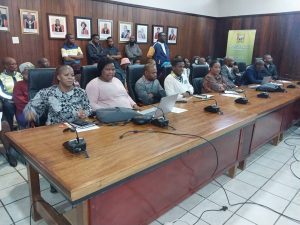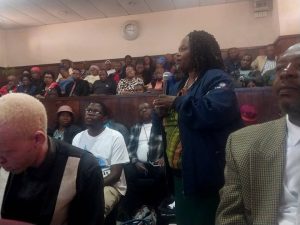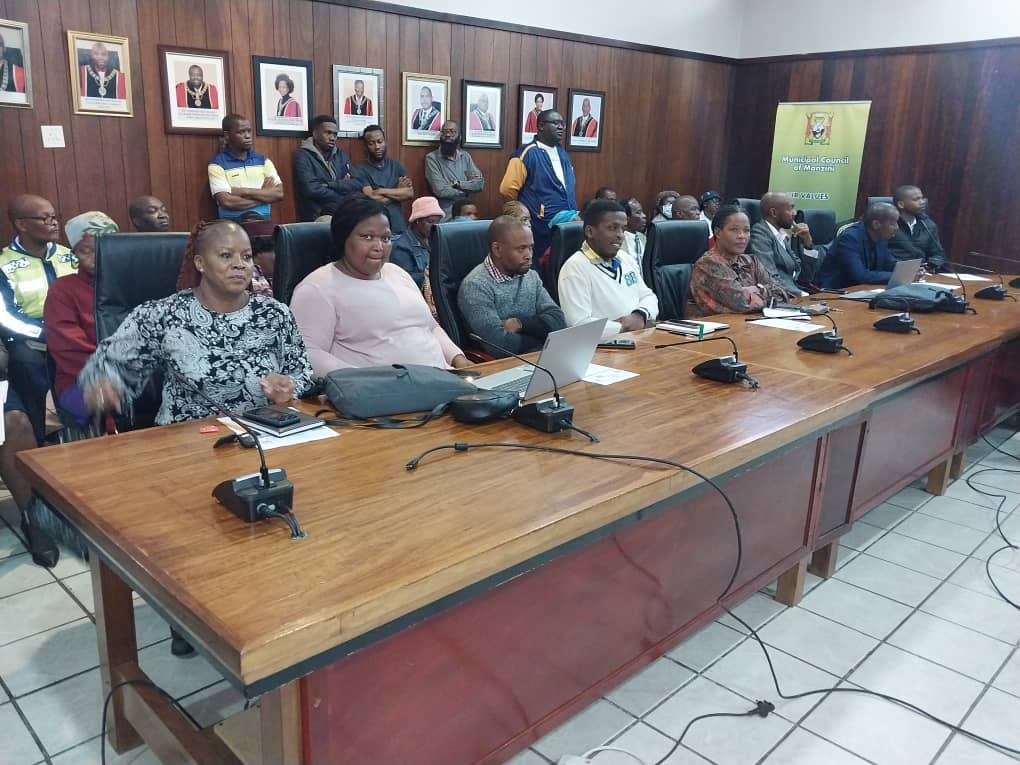By Thokozani Mazibuko
“As senior citizens, we can no longer afford to pay property rates. Therefore, the municipality should allocate funds for income-generating projects to ensure sustainability.”
This submission that was directed to the authorities of the Municipal Council of Manzini was made by some of the Manzini ratepayers yesterday during a stakeholder budget consultation meeting for the year 2025/2026 held at the municipality chambers.
The Acting Finance Director, Mduduzi Dlamini, informed ratepayers during a presentation that the 2025/2026 budget will rely on 90% property rates and 10% service charges, with no government subvention.
Dlamini explained that the government has suspended subventions to municipalities, making property rates the primary source of funding for the budget projections.
According to the ratepayers, given that most of them were now classified under the category of elderly people, who could no longer afford to pay rates, the municipality should consider budgeting for the establishment of income generating projects in the 2025/2026 budget, thus becoming a business entity.
The ratepayers pointed out that by venturing into the business fraternity, the municipality will be able to generate income that will be used to run the city and sustain the operations of the municipality.
They made an example that the municipality can establish new and revamp existing parks for profit generating purposes.
“For instance, the municipality can construct a park with a swimming pool, that will be accessible to the residents of Manzini at a fee,” said one of the ratepayers.
ALSO READ: Eswatini celebrates World Habitat Day, launches Urban October
The ratepayers also opined that a city hall that will generate revenue for the municipality should be incorporated into the 2025/2026 budget.
They pointed out that apart from the fact that most of them were elderly people, who were entrusted with the responsibility of paying property rates, yet they could no longer afford to generate income, most of the homesteads were now being headed by children and unfortunately,
a majority of them were unemployed following the high rate of unemployment amongst the youth and therefore, they cannot afford to pay the property rates either.
This, they said was because in most homesteads, both parents passed away as a result of covid-19 and HIV/ AIDS amongst other deadly diseases.
“We, therefore, pleaded with the municipality to become a business entity and establish income generate projects for self-sustainability purposes,” said the ratepayers.

An another note, the ratepayers also pointed out that the municipality should also take into consideration the inclusion of securing proper lights for the city of Manzini in the 2025/2026 budget, given that most of the city streets were very dark at night.
According to one of the ratepayers, this was one of the reasons why most people normally left the city early.
It was also the ratepayers’ submission that the municipality should include the rehabilitation of roads within the city as well as the provision of speed humps in some of the city’s roads which they described as high accidents zones.
The ratepayers also mentioned that it was also of particular vitality for the budget to include road markings in most of the city’s roads for safety purposes as most of them were no longer visible.
One of the ratepayers suggested that the municipality should reduce the number of security officers who are manning security in the city on behalf of the municipality and then channel the resources that would have
ALSO READ: EU-Eswatini Youth Advisory Board celebrates, reflects on one-year anniversary
been used to cater for the salaries of the reshuffled security officers towards the maintenance of the city’s infrastructure such as clearing of overgrown vegetation next to the city’s roads.
Two ratepayers, who stated that they were plying their trade as vendors in the city of Manzini, pleaded with the authorities of the municipality to include the construction of vendor shelters on the budget, given that most of the time they were affected by heavy rains while selling their wares.
They further pleaded with the municipality to include the installation of water tapes in the budget, so that they can use them to wash their customer’s fruits and vegetables.
Another rate payer urged the municipality to take into account the issue of resource mobilisation when coming up with the budget.
She pointed out that if need be, the authorities of the municipality can source volunteers that will assist them when mobilising the resources.
She added that the revenue that would be collected while mobilising the resources will be used in implementing the municipality’s projects such as the construction of roads.
Another ratepayer suggested that traffic fines for road users who have violated traffic laws within the city should be collected by the municipality as opposed to being collected by government, so that that money can be used towards the development of the city.
It was also the ratepayers’ submission that the payments of some utilities such as electricity and water should be collected by the municipality on behalf of the relevant entities such as Eswatini Electricity
Company (EEC) and Eswatini Water Service Cooperation (EWSC) and a certain percentage of the money they will agree upon, will then be given to the municipality in a form of a commission by the entities and by so doing, the municipality will be able to generate revenue.
Another rate payer opined that the municipality should allocate money to fix potholes within the budget as it was easier and less expensive to fix them (potholes) when they were still small compared to when they have been expanded.
The ratepayers also suggested that since names of some streets were no longer visible after the poles on which they were mounted were knocked down by cars, the municipality should allocate money in the budget that will be used to inscribe the street names on the pavements of the city.

They further pleaded with the municipality to consider including the construction of a recreational facility within the city on the budget, which will play a pivotal role in mitigating crime and curb the prevalent, yet high rate of substance abuse amongst the youth.
The ratepayers also urged the municipality authorities to improve their communication platforms by incorporating technological aspects therein.
They also pleaded with the municipality authorities to demand the subvention from the government, since it was their right as a city to receive one.
They further asked the municipality to include the construction of a conference centre on the budget, where visitors who are coming from outside the country into the city can be accommodated and, in the process, the municipality will generate revenue.
The municipality’s Chief Executive Officer, Lungile Dlamini assured the ratepayers that all their submissions have been taken into consideration.
She mentioned that the city of Manzini was run by ratepayers and therefore, some of their views will be included in the budget while some of them won’t be included.
However, she clarified that they would revert to the taxpayers and explain to them which of their views were included in the budget and which ones were not.
She mentioned that they would also shed light on why those who would be included were considered and why those who will not be taken into consideration were omitted during the drafting of the budget.


